Messages from SEEDIG 2017
24–25 May 2017 | Ohrid
Summarising SEEDIG 2017 debates
The ‘SEEDIG Messages’ are the main takeaways from our annual meetings; they reflect the discussions and are endorsed by participants.
The Messages below reflect the discussions held at the third SEEDIG annual meeting (Ohrid, May 2017).
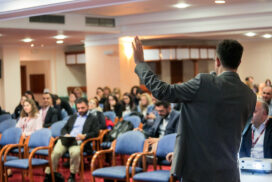
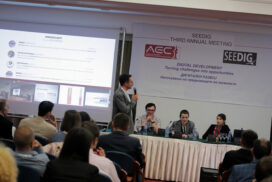
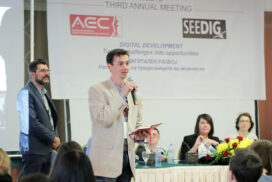
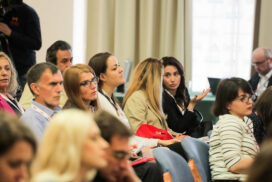
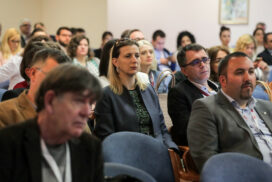
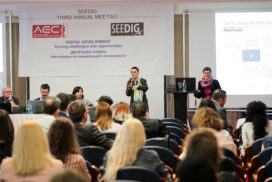
Internet governance: A puzzle or a Tower of Babel?
- The discussion around Internet governance is one around trust, and global efforts should be made to restore it.
- An analysis of the Internet governance initiatives is necessary, with the aim of creating common actions for (re)gaining the trust of end users.
- Preserving the openness and network neutrality of the Internet is important.
- Global efforts with multistakeholder and open community models of governance contribute to (re)gaining trust.
- Norms and regulations imply a long process and consultations, while technology is fast developing. This is one of the reasons why it is necessary to act jointly, in the sense that all relevant actors need to work together to create a safer and trustworthy online environment.
- Barriers to Internet governance should be dealt with in order to reflect the value of the Internet, by modernising rules, legislation, and policies.
Need for speed: Broadband challenges, issues and trends
- Online services create demand for access and they need to be promoted.
- Competition is important when it comes to broadband deployment, but the government must also create suitable market conditions.
- Access speeds need to be defned (more) clearly.
True or false? Guess! Fake news, misinformation, and the role of media literacy
- New technologies bring more actors to reporting, thus democratising conversation, which is happening horizontally.
- We should diferentiate between propaganda and fake news. The frst is about having a centre of power, which creates the vibrations that vibe the most. While the latter is related to entrepreneurs working with technology to deliver a message of
the day following the bazaar mentality. - We also need to distinguish between fake news and unprofessional journalism, as we tend to overuse the term ‘fake news’.
- We are living in the age of ‘fast food media’ that create short and not contextualised messages, and do not contribute to educating people, but rather the opposite. Media literacy can play a signifcant role in addressing this challenge.
- Media literacy consists of digital skills, critical thinking, and communication skills. However, it is not solely about education, but even more about the socio-economic environment.
How can the Internet of Things develop and be implemented in the right way?
- The IoT makes life easier, but in order to properly implement IoT solutions, we have to understand the society’s needs. We must think global and act local.
- The IoT bring benefts to people (jobs, easier access to information and other opportunities), businesses (innovation, competition, better products, faster trade), and governments (better public services, better and faster interaction with citizens). IoT technologies are important components of a smart city development, and they are also transforming the agriculture industry and enabling farmers to contend with the enormous challenges they face.
- The IoT promises an exciting era of innovation, but also raises signifcant privacy and security concerns. We can list the threats of IoT under three broad categories: privacy, security, and safety.
- The IoT cloud storage architecture provides additional risks with respect to privacy, security, and safety. There is a need for alternative technical, e.g. architectural solutions that would provide more privacy, security, and safety for users.
- IoT security is an issue, but we have to balance this with the trends in technology. We have to pay attention not only to the data itself, but also to those who own and use it.
- We should understand that sharing data is the basis of science evolution and the key of human evolution – and IoT makes it nowadays even moreso true. We definitely have to pay attention to privacy, but not at the risk of stopping the IoT evolution.
Data can be protected, but people will always find a way to misuse it.
Open data: Overview of policies and initiatives in SEE
- It is necessary to involve non-state actors in the process of opening data, because they are intended users of open data and can provide experiences and new ideas on how to make open data beneficial to all its users.
- Public institutions become more efficient, transparent, and accountable to citizens by using open data platforms. Moreover, they should assist citizens in understanding how they can make use of open data for their benefit.
- Challenges and lessons learned from open data experiences include centralised architectures for open data portals, visible licensing for the use of published data-sets, and unstandardised structure of related datasets.
- Key elements of open data include free culture, Internet freedom, and the right to privacy.
- Open data initiatives should be led by the people, especially by young entrepreneurs and students, not only by the government.
Internationalised Domain Names (IDNs): Status and perspectives in the SEE
- IDNs contribute to a more inclusive Internet, by promoting multilingualism and reaching different communities, especially in the SEE region which is so rich in alphabets and scripts.
- IDNs also present an important challenge: how to promote universal acceptance while keeping a functional Internet
- Despite the advantages of IDNs, the market seems to not be ready for it. One of the barriers is lack of awareness within the region, especially when it comes to seeing the importance of IDNs.
- The next action step is to start implementing measures to popularise IDNs in the region, by involving all stakeholders.
Cybersecurity: National and regional priorities and cooperation
- Cybersecurity is a complex area. It related firstly to the vulnerabilities of an operating system; but even if vulnerabilities are known, not many users pay attention to them or to the need to update their systems. Users are, usually, the weakest link. And ‘ignorance seems to be our new best friend!’.
- The software industry should be more responsible when it comes to embedding security features into their products. But the human factor is equally important.
- The most important words that we should keep in mind when it comes to cybersecurity are education, awareness, and a good security strategy.
- Cybersecurity laws and strategies are adopted completely different from one country to another, unfortunately. One solution to this challenge might rest in engaging different stakeholders in high-level discussions, asking them to synchronise their
policies.